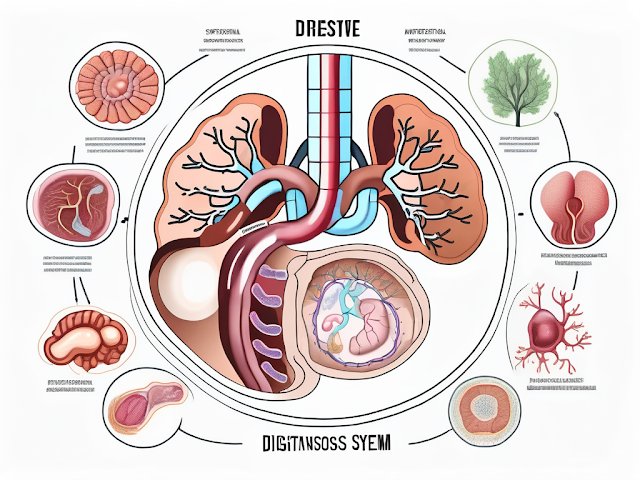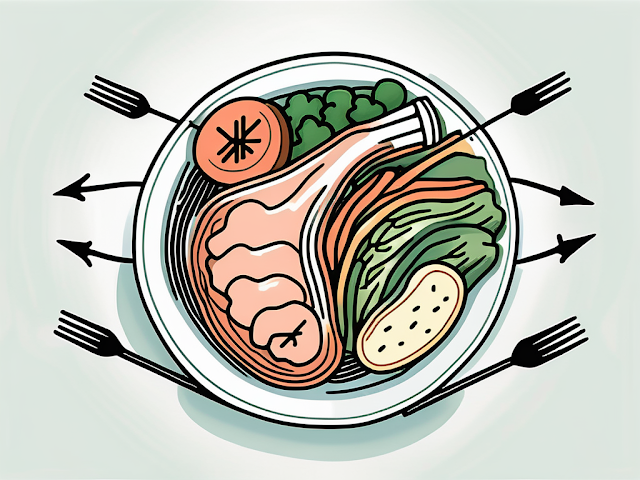Fast Digestion after a Large Meal
Eating a large meal can often leave us feeling sluggish and heavy, longing for a quick solution to alleviate the discomfort. Fast digestion after a large meal can be a welcome relief, as it allows us to return to our regular activities with renewed energy and vitality. However, understanding the digestive process and the factors that influence digestion speed can help us make informed choices to support our body's natural processes. In this article, we will explore the role of enzymes in digestion, how the body processes large meals, the benefits of fast digestion, the potential drawbacks, and tips to enhance digestion speed.
Understanding the Digestive Process
Digestion is a complex process that involves breaking down the food we consume into nutrients that our body can absorb. It begins in the mouth, where chewing and the secretion of saliva initiate the breakdown of food. As we swallow, the food travels down the esophagus and enters the stomach, where further digestion takes place.
The Role of Enzymes in Digestion
Enzymes play a crucial role in digestion. These specialized proteins facilitate chemical reactions that break down complex molecules into simpler forms. For instance, amylase breaks down carbohydrates, while proteases help break down proteins. Without enzymes, digestion would be a slow and inefficient process.
Did you know? The human body produces around 22 different types of digestive enzymes, each with its own unique function. These enzymes work together in a coordinated manner to ensure efficient digestion and absorption of nutrients.
How the Body Processes Large Meals
When we consume a large meal, our body increases the production and release of digestive enzymes to accommodate the increased food intake. The stomach secretes gastric juices, which contain hydrochloric acid and enzymes, to break down proteins and aid in digestion.
After the stomach, the partially digested food enters the small intestine, where the majority of nutrient absorption occurs. Here, the pancreas releases additional enzymes, including lipase for fat digestion and amylase for carbohydrate digestion. The small intestine also absorbs water, vitamins, and minerals.
Fun fact: The small intestine is not actually small in size. In fact, it measures around 20 feet long in adults! This incredible length provides a large surface area for nutrient absorption, ensuring that our body can extract as many essential nutrients as possible from the food we eat.
Throughout this process, the body works to efficiently digest and absorb the nutrients from the meal, providing us with the energy and sustenance needed for our daily activities.
Factors Influencing Digestion Speed
Several factors can influence the speed at which our body digests a large meal. Understanding these factors can help us make conscious choices to support optimal digestion.
The Impact of Meal Composition on Digestion
The composition of a meal significantly affects digestion speed. Meals rich in fiber, such as fruits, vegetables, and whole grains, tend to digest more slowly as fiber adds bulk to the stool and aids digestion. On the other hand, meals high in simple carbohydrates, like refined sugars and processed foods, are quickly broken down and can lead to a rapid increase in blood sugar levels.
Moreover, the presence of proteins and fats in a meal can also influence digestion. Proteins take longer to digest than carbohydrates, providing a sustained release of energy. Fats slow down digestion by delaying the emptying of the stomach, which can help you feel full for longer periods.
The Effect of Hydration on Digestion
Staying adequately hydrated is essential for optimal digestion. Water helps soften the food we consume, making it easier for the digestive enzymes to break it down. It also aids in the absorption of nutrients and promotes the movement of waste through the gastrointestinal tract.
In addition to water, herbal teas and certain fluids like broth can contribute to hydration levels and support digestion. Herbal teas, such as peppermint or ginger tea, are known for their digestive properties and can help alleviate symptoms like bloating or indigestion. Broths, especially bone broths, are rich in minerals and amino acids that support gut health and can be soothing to the digestive system.
The Benefits of Fast Digestion
Fast digestion offers several benefits that contribute to overall well-being.
One key advantage of fast digestion is the efficient absorption of nutrients. When food is digested quickly, the nutrients are absorbed more effectively by the body, providing essential vitamins, minerals, and energy in a timely manner. This can enhance overall health and support various bodily functions, such as immune system strength and muscle repair.
Energy Levels and Digestion Speed
After a large meal, we often experience a slump in energy levels. Fast digestion allows our body to quickly process the food and convert it into usable energy. This leads to a more balanced and sustained energy level throughout the day.
In addition to energy levels, fast digestion can also contribute to better mental clarity. When the digestive process is efficient, it reduces the likelihood of experiencing brain fog or sluggishness after eating. This can improve focus, productivity, and overall cognitive function.
Weight Management and Fast Digestion
Fast digestion can support weight management efforts. When our body efficiently digests and absorbs nutrients, it reduces the likelihood of excessive calorie intake and promotes a healthy metabolism. This, combined with a balanced diet and regular exercise, can contribute to maintaining a healthy weight.
Furthermore, fast digestion can help alleviate digestive discomfort. Slow digestion can lead to bloating, gas, and indigestion, whereas fast digestion promotes smoother and more comfortable digestion. This can enhance overall gastrointestinal health and reduce the risk of digestive issues.
Potential Drawbacks of Fast Digestion
While fast digestion can be beneficial, it's important to consider the potential drawbacks.
Fast digestion is often associated with a rapid spike in blood sugar levels, followed by a quick drop. This rollercoaster effect can leave you feeling fatigued and hungry shortly after eating, leading to increased cravings for unhealthy snacks. To maintain stable energy levels throughout the day, it's essential to balance fast-digesting foods with slower-digesting options like whole grains, healthy fats, and proteins.
Nutrient Absorption and Digestion Speed
When digestion occurs too quickly, the body may not have enough time to absorb all the essential nutrients from the food. This can lead to nutrient deficiencies and compromise overall health. Ensuring a well-balanced diet and mindful eating habits can help mitigate this concern.
Moreover, fast digestion can impact the gut microbiota, the community of beneficial bacteria in our digestive system. A rapid transit time can disrupt the delicate balance of these microorganisms, potentially affecting immune function and inflammation levels. Including fiber-rich foods and fermented products in your diet can support a diverse and healthy gut microbiome.
The Link Between Fast Digestion and Gastrointestinal Issues
Fast digestion can sometimes trigger gastrointestinal discomfort, such as bloating, gas, or diarrhea. This may be more prevalent when consuming certain types of food or experiencing digestive conditions like irritable bowel syndrome (IBS). Tailoring our diet and seeking medical advice can help manage such issues.
In addition, the speed of digestion can influence satiety signals sent to the brain. Rapid digestion may not provide a lasting feeling of fullness, potentially leading to overeating and weight gain over time. To support feelings of satiety, focus on incorporating foods high in fiber and protein, as they can help promote a sense of fullness and satisfaction after meals.
Tips to Enhance Digestion Speed
To support fast digestion, we can make dietary and lifestyle modifications. Here are some tips to enhance digestion speed:
Dietary Changes for Faster Digestion
Include foods rich in enzymes, such as pineapple and papaya, which can aid digestion. Consuming smaller, more frequent meals can also promote faster digestion and prevent overloading the digestive system.
Additionally, incorporating probiotic-rich foods like yogurt and kefir can help maintain a healthy gut flora, which is essential for efficient digestion. High-fiber foods like whole grains, fruits, and vegetables can also aid in digestion by promoting regular bowel movements and preventing constipation.
Lifestyle Modifications to Improve Digestion
Engaging in regular physical activity, such as walking after a meal, can stimulate digestion. Practicing mindful eating, which involves eating slowly and savoring each bite, can also support proper digestion.
Moreover, staying hydrated by drinking an adequate amount of water throughout the day is crucial for maintaining optimal digestion. Adequate hydration helps soften stool, making it easier to pass and reducing the likelihood of constipation.
By embracing these tips and considering the role of enzymes, the body's digestion process can be optimized to ensure fast digestion after a large meal. Remember, supporting digestion is not only about speed but also about providing the body with the necessary nutrients for overall health and well-being.



